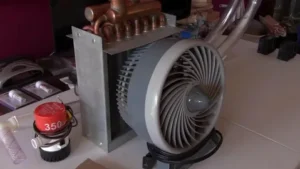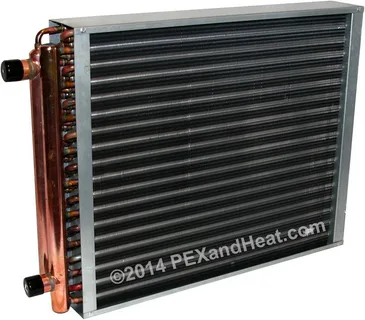Imagine stepping into your home and feeling an immediate sense of comfort, no matter the season outside. A key player in achieving that cozy atmosphere lies within a device you may not think about often: the Hot Air-Exchanger. These innovative components quietly work behind the scenes in modern HVAC systems to enhance indoor air quality and energy efficiency. As homeowners become increasingly aware of their environmental impact, understanding how hot air exchanger function has never been more crucial. From optimizing energy consumption to reducing utility bills, these devices represent a blend of technology and sustainability that can transform any living space into an efficient haven. Let’s dive deeper into what makes Hot Air-Exchangers vital for today’s homes!
Understanding Hot Air-Exchangers: What You Need to Know
Hot Air-Exchangers play a vital role in modern HVAC systems. They facilitate the transfer of heat between two air streams without mixing them. This process enhances indoor comfort while optimizing energy use. These units operate on the principle of thermal exchange. Warm, stale air is expelled from your home, and its heat is transferred to incoming fresh, colder air.
As a result, you can maintain a comfortable temperature indoors, even during extreme weather conditions. Understanding how these devices work helps homeowners appreciate their value. They improve indoor air quality and reduce strain on heating and cooling systems. Integrating Hot Air-Exchangers into your setup creates an efficient climate control system that benefits your wallet and the environment. Investing in one means you’re making strides toward sustainability while enjoying enhanced comfort levels at home.
How Does Air Heat Exchanger Improve Energy Efficiency in Your Home?
Air heat exchanger is crucial in enhancing energy efficiency within residential spaces. They transfer heat between incoming and outgoing air streams, capturing waste heat that would otherwise escape. This process reduces the workload on your HVAC system. You can expect lower monthly utility bills when less energy is required to maintain comfortable temperatures.
Moreover, these devices help maintain consistent indoor air quality. By exchanging stale indoor air with fresh outdoor air while retaining warmth, they ensure your home remains cozy and well-ventilated. The result? A more efficient heating system that not only conserves energy but also promotes a healthier living environment. Homeowners benefit from improved comfort levels throughout the year without sacrificing sustainability or incurring high costs.
Maintenance Tips for Optimal Performance of Hot Air-Exchangers
Regular maintenance is crucial to ensure your Hot Air-Exchanger operates efficiently. Here are some tips to keep your Hot Air-Exchanger in optimal condition:
Clean or replace the filters.
The filters in your Hot Air-Exchanger should be cleaned or replaced regularly, depending on the type of filter and the amount of use. Dirty filters can restrict airflow and reduce efficiency.
Check the heat exchange surface.
Over time, the heat exchange surface can become dirty or corroded, which can affect the performance of your Hot Air-Exchanger. Regularly check and clean this surface to maintain optimal heat transfer.
Inspect and clean fans and motors.
The fans and motors in your Hot Air-Exchanger should be checked for any dirt or debris buildup that could obstruct airflow. Cleaning them regularly will ensure proper operation.
Lubricate moving parts
Some Hot Air-Exchangers have moving parts that require lubrication to operate smoothly. Refer to your manufacturer’s instructions for recommended lubricants and maintenance intervals.
Check electrical connections
Make sure all electrical connections are secure and free from corrosion or damage. Loose connections can cause malfunctions, while damaged ones pose a fire hazard.
 The Benefits of Air to Air Heat Exchanger for Residential Use
The Benefits of Air to Air Heat Exchanger for Residential Use
Air to air heat exchanger is highly beneficial for residential settings because they efficiently transfer heat between incoming and outgoing air. This process significantly reduces energy costs and helps to maintain comfortable temperatures without overworking your HVAC system. By effectively recycling indoor air, these devices play a crucial role in ensuring a consistent climate throughout your home, leading to lower utility bills and increased energy efficiency.
In addition to their energy-saving benefits, air-to-air heat exchangers contribute to improved indoor air quality by filtering out pollutants and allergens. They allow fresh outdoor air to enter while preserving the warmth or coolness of existing indoor conditions. This enhances the overall comfort of the indoor environment and promotes better ventilation practices in homes, leading to a healthier living environment.
Furthermore, homeowners benefit from the reduced environmental impact of these systems. With decreased energy consumption, there is a corresponding decrease in the carbon footprint associated with heating and cooling needs. This means that in addition to saving money and improving comfort levels, air-to-air heat exchangers also offer environmental benefits by lowering the overall energy usage in residential spaces.
Environmental Impact of Hot Air-Exchangers
Hot Air-Exchangers are essential components of HVAC systems, significantly reducing energy consumption and promoting environmental sustainability. These systems efficiently transfer heat between incoming and outgoing air, minimizing the need for additional heating or cooling. As a result, there is a reduced reliance on fossil fuels, which leads to a substantial decrease in greenhouse gas emissions. This not only benefits individual households but also contributes positively to climate health on a larger scale.
In addition to their energy-saving benefits, Hot Air-Exchangers contribute to improved indoor air quality. By facilitating ventilation without excessive energy waste, these systems ensure fresh outdoor air circulates more effectively while stale indoor air is expelled. This promotes a healthier living environment for occupants and reduces the potential for indoor air pollution.
As sustainable living practices become increasingly important, integrating Hot Air-Exchangers into residential HVAC systems becomes vital. By doing so, homeowners can take a proactive step towards reducing their carbon footprint and embracing eco-friendly living. Ultimately, the widespread adoption of Hot Air-Exchangers positively contributes to individual households and the planet.
Features to Look for in Air to Air Heat Exchanger Residential
Several features should be at the forefront of your red when searching for an air to air heat exchanger residential.
- First, consider the efficiency rating. Look for models with high ratings that promise optimal energy recovery.
- Next, check the construction materials. Durable materials enhance longevity and improve performance. A well-constructed unit will withstand varying environmental conditions.
- Another critical feature is airflow capacity. Ensure it meets your home’s requirements without causing unnecessary strain on your HVAC system.
- Don’t overlook noise levels; quieter units provide a more comfortable living environment.
- Also, look for easy maintenance options like removable filters and user-friendly designs that simplify upkeep tasks.
Connectivity features can be advantageous, too. Innovative technology allows you to monitor and adjust settings remotely to conveniently manage your home’s climate efficiently.
Key Benefits of Using Hot Air-Exchangers in HVAC Systems
Hot Air-Exchangers play a crucial role in enhancing HVAC systems. They facilitate heat transfer between incoming and outgoing air, optimizing temperature regulation without significant energy loss.
- One significant benefit is improved indoor comfort. Maintaining consistent temperatures year-round helps eliminate cold drafts during winter and excessive heat in summer.
- Additionally, these exchangers boost energy efficiency. They leverage recovered heat to warm up fresh air entering your home, which can lead to substantial savings on utility bills over time.
- Another advantage includes reducing humidity levels indoors. This creates a healthier living environment by discouraging mould growth and improving air quality.
Using Hot Air-Exchangers contributes positively to sustainability efforts. By lowering energy consumption, homeowners can significantly reduce their carbon footprint while enjoying enhanced thermal comfort at home.
How Can Residential Air to Air Heat Exchanger Lower Your Utility Bills?
Residential air to air heat exchanger is designed to optimize energy use within your home. Transferring heat between incoming and outgoing air helps maintain a comfortable indoor climate while minimizing energy waste. When the system draws in cold outdoor air, it pre-warms it using the warm, stale air leaving your home. This process reduces the load on your heating system, allowing it to operate more efficiently.
As a result, you can enjoy consistent temperatures without relying heavily on traditional heating methods. This efficiency translates directly into lower utility bills. Homeowners often notice significant savings as their HVAC systems consume less energy, especially during peak seasons when demand is high. Investing in an effective heat exchanger contributes to immediate financial benefits and enhances overall comfort by ensuring fresh airflow throughout your living space.
Innovations in Hot Air-Exchanger Technology
Recent advancements in Hot Air-Exchanger technology have significantly transformed HVAC systems. Manufacturers are now focusing on more efficient materials, enhancing heat transfer capabilities while minimizing energy loss. Smart controls have emerged as a game changer. These intelligent systems can adjust airflow and temperature based on real-time data, optimizing home comfort without wasting energy. Innovative designs such as counterblow and cross flow configurations maximize efficiency.
These setups allow for better heat exchange between incoming and outgoing air streams. Sustainability has also taken centre stage. Many new models incorporate recyclable components or use eco-friendly refrigerants, reducing their environmental footprint. With these innovations, Hot Air-Exchangers promise improved performance and align with the growing demand for energy-efficient solutions in residential heating and cooling systems. This shift paves the way toward brighter living spaces catering to comfort and sustainability needs.
Maintaining Your Heat Exchanger Air to Air for Optimal Performance
Regular maintenance of your heat exchanger air to air is essential for optimal performance. Start by routinely checking and cleaning the filters. Clogged filters can restrict airflow, reducing efficiency. Inspect the ductwork for any leaks or blockages. Even small gaps can lead to significant energy losses over time. Sealing these issues ensures that heated or cooled air flows where needed most.
Additionally, examine the coils for dirt buildup. Clean coils allow for better heat transfer, enhancing overall system effectiveness. Consider scheduling professional inspections annually. Experts can identify problems early and provide insights on necessary repairs or upgrades. Keep an eye on humidity levels in your home as well; excessive moisture can impact performance negatively. Addressing these factors will help maintain a comfortable environment while maximizing energy savings in your HVAC system.
Conclusion
Hot air exchangers play a crucial role in modern HVAC systems. Their ability to enhance energy efficiency makes them indispensable for homeowners looking to reduce costs. As technology evolves, these systems become increasingly efficient and user-friendly. The innovative features can significantly improve indoor comfort while minimizing environmental impact. Regular maintenance ensures that your hot air exchanger operates at peak performance. This not only prolongs its lifespan but also maximizes savings on utility bills.
FAQs
When it comes to Hot Air-Exchangers, homeowners often ask many questions. Here’s a quick guide to some of the most common inquiries:
What exactly is an air heat exchanger?
An air heat exchanger transfers heat between two air streams without mixing them. It is essential in HVAC systems to improve energy efficiency and maintain comfortable indoor conditions.
How can I tell if my Hot Air-Exchanger needs maintenance?
If you notice decreased airflow, strange noises from your system, or increased energy bills, it may be time for maintenance. Regular checks on filters and components can help prevent these issues.
Can installing a Hot Air-Exchanger lower my utility bills?
Yes! By recovering waste heat and reducing reliance on heating systems, a properly functioning Hot Air-Exchanger can significantly save energy costs over time.
Are there different types of heat exchangers available for residential use?
Absolutely! There are various designs, including plate exchangers and rotary units. Each type has its benefits tailored to specific home requirements.
| Other Good Articles to Read |
| Blogs Rain |
| Cme Blog Spot |
| Garcias Blogs |
| Yyc Blogs |
| Blogs-Hunt |
| Impact-Blog |
| Smarty Blogs |
| Ed Blog |
| Mo Blogs |
| Blogs Em |
| Blogs T |
| Related Business Listings |
| Contact Directory |
| Local Business Profiles |

